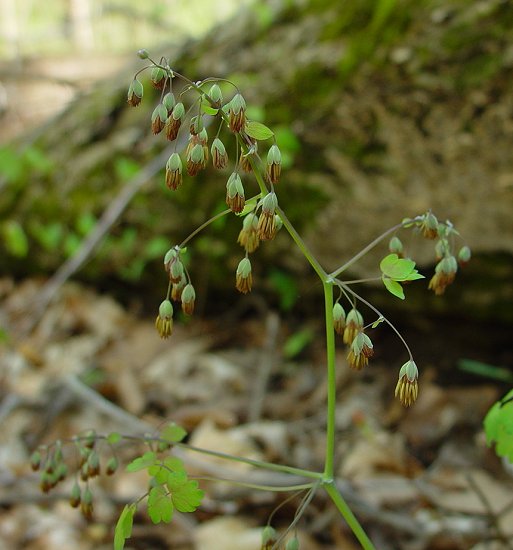Thalictrum dioicum L.
Early Meadow-Rue

Native
CC = 8
CW = 3
MOC = 24
© DETenaglia
Thalictrum dioicum L.Early Meadow-Rue | |
 |
Native CC = 8 CW = 3 MOC = 24 |
© DETenaglia |
|
Family - Ranunculaceae Habit - Perennial forb, dioecious, with short rhizomes and more or less slender, nontuberous roots. Stems - Erect, to 70 cm. Leaves - Alternate, few to several, all noticeably petiolate; well-developed lower leaves 3 or 4 times ternately or ternately-pinnately compound, the largest leaflets 1.5-2.8 cm long, shorter than to slightly longer than wide, broadly elliptic to obovate, kidney-shaped, broadly heart-shaped, or nearly circular, 3-7-lobed, the lobes rounded to truncate, relatively thin and membranous in texture, the margins entire or more commonly scalloped, sometimes slightly thickened or inconspicuously revolute (the curled-under portion 0.05-0.10 mm wide), the undersurface and stalk glabrous or with inconspicuous sessile glands, the minor veins not raised from the surface.
Inflorescence - Panicles, the branches glabrous or with inconspicuous sessile glands. Flowers - Imperfect. Sepals 4, 3-5 mm long, green or purple. Filaments yellow to greenish yellow.
Fruits - Achenes 3-4 mm long, narrowly ellipsoid, sometimes appearing short-stalked, the beak 1.5-2.0 mm long, often shed except for a minute, peglike base, the surface glabrous or with inconspicuous sessile glands. Flowering - April - May. Habitat - Bluffs, mesic upland forests, streambanks, rich north-facing slopes and ledges. Origin - Native to U.S. Lookalikes - Other species of Thalictrum. Other info. - This species can be found scattered throughout Missouri but is most common in the southern half of the state. This is the easiest species of Thalictrum to identify in Missouri because of its early flowering period and relatively small size. T. dioicum is dioecious meaning that male (staminate) and female (pistillate) flowers are on different plants. The images above show a staminate plant. Photographs taken in Brown Summit, NC., 4-12-03 (DETenaglia). |